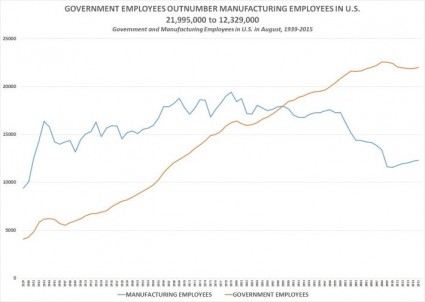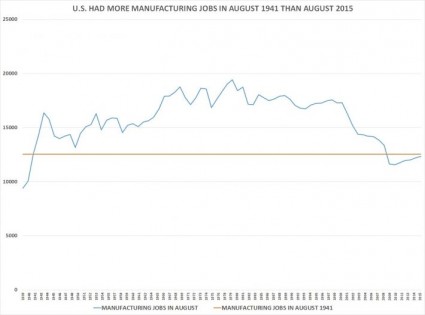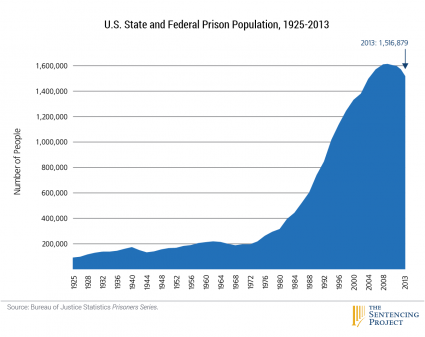September 14, 2015
By: Kelly Diamond, Publisher

Government employees outnumber manufacturing employees by nearly 2 to 1.
The first question might naturally be: Has manufacturing EVER outnumbered government employees? And the answer would be, yes. Up to 1989, in fact, manufacturing employment was higher than that of government. We actually have LESS people employed in manufacturing today than we did in the year leading up to the attack on Pearl Harbor.
“There were 21,995,000 employed by federal, state and local government in the United States in August, according to [Bureau of Labor Statistics]. By contrast, there were only 12,329,000 employed in the manufacturing sector.” (Source: BLS & CNSNews.com)
What on earth is happening here? Two things are happening simultaneously: the government is adding to its numbers while manufacturing is hemorrhaging out of the country. In short, the United States is an overpriced place to do business as a manufacturer and that’s due in part to the expanding waistline of a very bloated government… at all levels.
The natural inclination of politicians and their media mouthpiece punditry is to scapegoat. They want to blame people who buy products made elsewhere. Democrats blame corporates for moving offshore; Republicans blame Democrats for the high tax and regulation regimes that chase off corporations in the first place. Both are responsible for the exponential growth of government employees, however. Democrats need to regulate the life out of corporations, and Republicans need to monitor the life out of the individuals… both need the taxpayers to foot the bill for meddling in our affairs to the point of economic collapse.
So here we are, with government employees exceeding the number of those in manufacturing. What was once a thriving and industrious stomping ground for our working and middle class is a veritable ghost town.
The problem with this sort of table turning is that whereas wealth and goods were once being produced at a larger rate than it was being flushed away, now we are flushing money faster than we are producing it in the manufacturing sector. The manufacturers didn’t just make goods, they created wealth… and they did so at a profit. Government employees are not producers, they are busybodies. They don’t create wealth, they destroy it. And whatever profits or gains are had from that redistribution isn’t shared across the entire population, but rather allocated to a select few we know as cronies.
What about automation?
Where automation might reduce the need for labor in one place, it requires labor in a new place. If an ATM takes the job of a teller, then the occupation of those who manufacture, maintain, and sell the ATMS – as well as those who run and manage those companies – is created in the tellers’ place.
It’s not that the number of jobs overall is reduced through automation as much as the number of jobs in a certain capacity or occupation is reduced and replaced with new and different jobs.
So if the relative number of jobs remains the same, where did they go? The politicians were right to say offshore. And the Republicans are right to blame high taxes and regulation. The producers are leaving and all that remains are the rules and bureaucrats that chased them away in the first place.
Throughout the United States there is the demand to raise the minimum wage to $15 per hour, more licensing laws and higher fees, stricter “safety” regulations, and more benefits. This isn’t free. Not only is the implementation not nearly as effective in accomplishing its goals as the rhetoric presumes, it prices the United States out of the market for sectors like manufacturing. Countries that have a less onerous tax regime and take a more laissez faire approach to corporate regulation are the beneficiaries of corporate inversion: plain and simple.
Employers and employees used to both view one another as a means to an end. The employer regards the employee’s labor as a commodity and a means to produce more to accommodate the demand for their goods and/or services. Employees regarded their employers as a means to create wealth, provide for their wants and needs, and receive training and experience to move up in their careers.
Now employers are tasked with everything from providing health insurance to helping their employees self-actualize! Rather than being the benefits of working for X instead of Y, it’s the mandated compensation of all companies. Not much left to make employers competitive. By nationalizing everything, mandating this sameness across industries, and homogenizing business models, we are poised for cartels and monopolies.
What we have in our agricultural, energy, telecom, healthcare, and banking industries will soon be the way of what we have in manufacturing and every other sector. It will be so regulated, only a few juggernauts will endure while the little guys, and would-be entrepreneurs will fizzle away.
Another government population that has grown at incredible speeds worth mentioning is the prison population. If you consider that each of those individuals not only cost taxpayers $25,000 to $30,000 per year on average to hold, and the fact that their records are marred for life so they become ineligible to truly reintegrate into society and become productive individuals, what you essentially have are the basic equivalent of more government employees.
Yes, over the last couple years, incarceration rates have modestly receded, due in large part to budget constraints and taxpayers simply preferring their tax dollars to be spent on education and healthcare rather than prisons. This hardly atones for the over 675% increase in prison populations over the course of 35 years. If the tides are in fact changing for the better, it will take several generations to reduce this economic burden to a more manageable level at the rate it’s currently going.
It’s not about JUST public assistance recipients. It’s about the cost of every government employee, their pensions, and their benefits, along with those who fail to comply with every petty ordinance imposed and enforced on our society. This is just a tiny snapshot of the overriding problem of too much government. The private sector is being overrun, phased out, or maybe just chased away… and quite frankly, I’m neither surprised nor upset by it.
It’s not cowardice, it’s self-defense. If there is a way in which you can protect your assets, your business, or your freedom offshore, wouldn’t it make sense to find it… no matter where in the world that safe haven might be?




